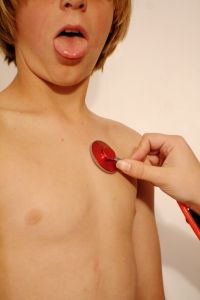
We’re still fighting a bug over here. I think that I may be fighting it off, although last night’s less-than-stellar sleep may help it win. I suspect it’s the flu. We live in an area where everyone seems to have the flu these days, and many people have “the” flu: H1N1 or swine flu.
I’m not normally someone who panics about disease. When my daughter gets a fever, I don’t exactly embrace it, but I do accept it fairly gracefully. Fever is her way of fighting off an illness, and she does it with style. She’s been known to go up to 105 degrees at the drop of a hat. While this makes her body feel lousy, she does know that she’s fighting off the virus, and that helps her feel a little better about the experience.
What can you do to help your preschooler avoid the flu?
1. Handwashing, handwashing, handwashing. We’re getting better at this around our house. We sing “Twinkle, Twinkle Little Star” as we wash our hands, we wash with soap when we come into the house, after visiting other people, and before eating.
2. I try to avoid touching my face with my hands during the day, and I encourage my daughter to do the same.
3. My daughter coughs into her elbow to avoid spreading germs with her hands.
4. We eat a relatively healthy diet, with lots of fruits and vegetables.
5. We try to get enough rest. Children need 10-12 hours of sleep in a 24 hour period.
What can you do if your preschooler gets the flu?
Rest. This is where we fell down, if you read the saga of my daughter’s attempted sleepover the other night. Lots of rest breeds a happy, healthy preschooler. Small children need 10-12 hours of sleep in a 24 hour period, and they need more when they are sick.
Fluids. If your child has a fever and respiratory symptoms, they need lots of fluid to stay hydrated and to flush all of the mucus away.
Be sensitive about how quickly a fever is rising. I do medicate for a fever when I realize that it is rising very quickly, since I want to avoid a febrile seizure.
Be wary of cough medicines. The FDA now recommends against giving cough medicine to children under age 2, and has further warnings for older children. This is partially due to the fact that these medicines have not been adequately shown to have a positive effect on children and partly due to concerns about dosing and combining medications. Children may also be sensitive to the medicinal ingredients in cough medicines.
If in doubt, call the doctor or go to a clinic or the hospital. If you have concerns about your child’s fever or respiratory symptoms, it’s important to get a professional opinion.
How do you fight the flu in your house?

